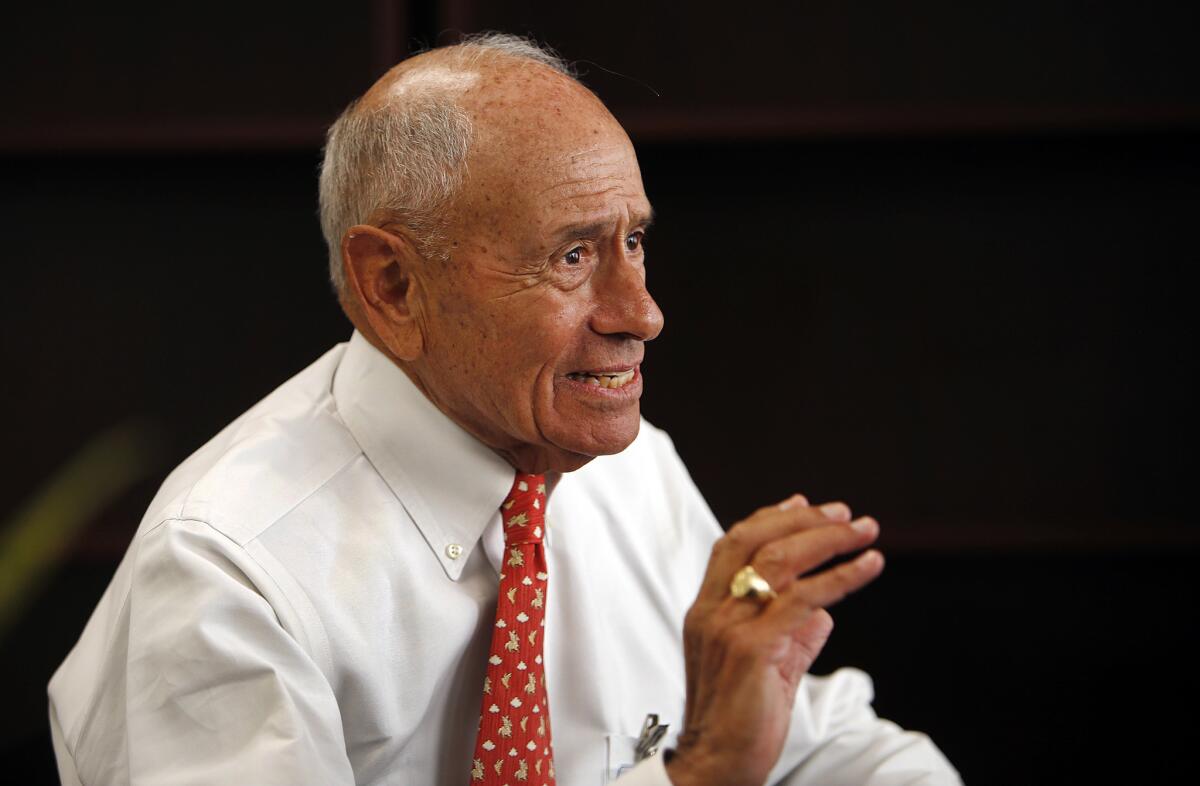Looming deficits could push L.A. Unified into bankruptcy, panel says

L.A. schools Supt. Ramon C. Cortines has defended recent contract agreements with employee groups, but a panel he authorized warns of budget troubles ahead.
The Los Angeles Unified School District is facing a looming, long-term deficit that could force the system into bankruptcy, a panel of experts has concluded in a new report obtained by The Times.
The group, which met in private over the last several months, concluded that L.A. Unified will face a budget deficit of $333 million in the 2017-18 school year, an additional $450 million the following year and $600 million more the year after that.
This year’s general fund totals about $7.1 billion.
L.A. schools Supt. Ramon C. Cortines convened the panel in response to critics who said the district could not afford its recent contract agreements with employee unions. These critics included Chief Financial Officer Megan Reilly, who helped to oversee the work of the fiscal committee.
The panel’s estimates were consistent with what Reilly and her staff had concluded, although employee unions have questioned whether the situation is as dire as predicted.
In a statement Thursday, Cortines, who plans to retire when a replacement is named, said the report will prove invaluable to the district and the next schools chief.
“I hope it will give the new superintendent a starting point for the important discussions that will take place in our district,” Cortines said.
Cortines has defended the labor contracts as affordable, provided that the district takes other necessary steps.
All parties agree on the importance of extending a statewide tax increase that funds education and will soon expire. Without that, school systems across the state would be hard-hit.
“The report is a critical reminder how the voters of the state of California have played a crucial role in beginning to uplift public education,” a role that needs to continue, said Juan A. Flecha, president of the union that represents district administrators, after reviewing the findings.
The panel made a point of offering a vote of confidence in some L.A. Unified efforts — “we did not find a failing school district in Los Angeles” — but cautioned that success might not be long-lasting.
“We found that many of the near-term successes will be very difficult to maintain and expand in the face of very stark demographic and financial forecasts,” the report said.
Other financial challenges include rising healthcare costs and much higher pension contributions that are required by state law.
Declining enrollment, meanwhile, is driving down revenue; the district’s number of employees has, so far, not matched that decline. About half of the decline results from the growth of independently operated charter schools. That trend would accelerate sharply under a plan, spearheaded by philanthropist Eli Broad, to move half of district students into charters over the next eight years.
If declining enrollment “cannot be reversed, the district’s future planning will be characterized by constant down-sizing and loss of revenue until the district reaches a new equilibrium at a lower, but sustainable, level,” the report said. If the district can’t adapt, it can’t remain viable, according to the report.
The head of the teachers union said the report underscores the importance of opposing the proposed charter expansion.
“The committee appropriately takes a very hard look at whether a public school district will be able to survive when unregulated charter schools are drawing students away and leaving the highest-needs students for the district to serve with much less money,” said Alex Caputo-Pearl, president of United Teachers Los Angeles.
L.A. Unified also spends more than it should on cafeteria operations and compensation for injured workers, the report said.
The panel made numerous recommendations, including: improving student and teacher attendance, offering an early retirement program, advocating for increased funding and reducing the total staffing in line with declining enrollment. The report also called for lowering the cost of services provided to disabled students.
The committee will formally present its findings at next week’s school board meeting.
The panel’s members are Maria R. Anguiano, vice chancellor for planning and budget at UC Riverside; Delaine Eastin, former state superintendent of public instruction; Michael H. Fine, a school district fiscal analyst; Bill Lockyer, former state attorney general and treasurer; Darline Robles, a retired superintendent who also is part of the superintendent search firm; Miguel Santana, city administrative officer for Los Angeles; Darrell Steinberg, former state Senate leader; Peter J. Taylor, former executive vice president and chief financial officer of the University of California; and Kent Wong, director of the UCLA Labor Center.
Twitter: @howardblume
The Broad Foundation has given money to the California Community Foundation and the United Way of Greater Los Angeles to support Education Matters, a new Times digital initiative devoted to more in-depth reporting on schools.
ALSO
Case of pedestrian struck by car at 2014 Zombie Walk goes to jury
Search for new L.A. schools chief shifts focus to individual candidates
Family of Chinese mom who died after birth complications gets $5.2 million
More to Read
Sign up for Essential California
The most important California stories and recommendations in your inbox every morning.
You may occasionally receive promotional content from the Los Angeles Times.











